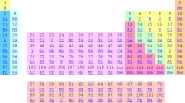


Mercury
 This is one of the two elements which is liquid at room
temperature, the other being bromine. Mercury is
a liquid, shiny silvery metal, which is comparatively corrosion resistant.
However,
sufficiently concentrated nitric acid and hot concentrated sulphuric acid are
capable of attacking this metal at an appreciable rate.
This is one of the two elements which is liquid at room
temperature, the other being bromine. Mercury is
a liquid, shiny silvery metal, which is comparatively corrosion resistant.
However,
sufficiently concentrated nitric acid and hot concentrated sulphuric acid are
capable of attacking this metal at an appreciable rate.
In spite of its very interesting properties, both physically and chemically, mercury is not a compound to start with. Mercury and its compounds are very toxic for humans and for the environment.
![]() When droplets of mercury are spilled inside the house, then there may be a huge
problem. Mercury metal slowly evaporates. The vapor of the metal is very toxic
and when one is living in such polluted air for many hours per day, then slowly
severe diseases will develop. Especially, when there are cracks, little craves
and wrinkles in the floor (e.g. a wooden floor), then removing drops of mercury
is really difficult. A spill of mercury may make a house inhabitable and it may
cost thousands of dollars to have the spills removed (e.g. by breaking out the
wooden floor from a house). For this reason, it is suggested to refrain from
experimenting with metallic mercury at all! Metallic mercury is very heavy and
mobile and it is very easy to spill some drops on the floor, which will break
apart into zillions of very small droplets, scattered all over the place!
When droplets of mercury are spilled inside the house, then there may be a huge
problem. Mercury metal slowly evaporates. The vapor of the metal is very toxic
and when one is living in such polluted air for many hours per day, then slowly
severe diseases will develop. Especially, when there are cracks, little craves
and wrinkles in the floor (e.g. a wooden floor), then removing drops of mercury
is really difficult. A spill of mercury may make a house inhabitable and it may
cost thousands of dollars to have the spills removed (e.g. by breaking out the
wooden floor from a house). For this reason, it is suggested to refrain from
experimenting with metallic mercury at all! Metallic mercury is very heavy and
mobile and it is very easy to spill some drops on the floor, which will break
apart into zillions of very small droplets, scattered all over the place!
Metallic mercury frequently can be obtained at eBay at reasonable cost (e.g. in mercury-switches), but it is best not to take out the mercury metal for chemical experiments. If you really want to experiment with mercury metal, never do this inside and never do this near a place of a garden, where vegetables may be grown.
![]()
Water-soluble mercury compounds are even more toxic than the metal. Obtaining these becomes more and more difficult, due to their great toxicity. In the past, mercury compounds were used in photography as part of an intensifier (so-called VMI-intensifier), but that use is almost completely banned nowadays.
Mercury exists in the +1 oxidation state and the +2 oxidation state in its compounds. Mercury (I) ion is not a simple ion, but it is a dimer, Hg22+. This is a colorless ion, which is quite unstable. It easily disproportionates into the metal and the divalent ion. It can be made more stable, when it is precipitated from a solution, such as with chloride. Mercury (II) also is a colorless ion. This exists as the single ion Hg2+. Mercury compounds even are more covalent than the corresponding cadmium compounds. E.g. the compound HgCl2 hardly is ionized, when it is dissolved in water. The chemistry of mercury is quite interesting. It has interesting coordination chemistry and redox chemistry. It also forms some remarkable solid state compounds whose color depends wildly on temperature, which can easily be prepared by the home chemist.
Only one compound of mercury, mercury (II) chloride, HgCl2, is available for the general public at reasonable price, provided that shipping of this compound is possible for an acceptable price. Mercury (II) chloride is a white solid, which dissolves in water moderately well. It can be used for many interesting experiments, but extreme care must be taken.


![]()
![]() Be prepared
that mercury (II) chloride probably is the single most toxic compound you can
have in your home lab!! Mercury (II) chloride is more toxic than sodium cyanide!
Besides that, it is a cumulative poison. This makes working with mercury
chloride more dangerous than working with e.g. sodium cyanide or chlorine gas.
Exposure to the latter may be very dangerous, but exposure to small amounts will
be harmless, every time, when there is such a weak exposure again. The body does
not 'remember' exposures. With mercury compounds things are different. Each
exposure to mercury compounds is 'remembered' and many weak exposures can have
the same effect as a single strong exposure.
Be prepared
that mercury (II) chloride probably is the single most toxic compound you can
have in your home lab!! Mercury (II) chloride is more toxic than sodium cyanide!
Besides that, it is a cumulative poison. This makes working with mercury
chloride more dangerous than working with e.g. sodium cyanide or chlorine gas.
Exposure to the latter may be very dangerous, but exposure to small amounts will
be harmless, every time, when there is such a weak exposure again. The body does
not 'remember' exposures. With mercury compounds things are different. Each
exposure to mercury compounds is 'remembered' and many weak exposures can have
the same effect as a single strong exposure.
![]() Mercury compounds may be a real pain to dispose of properly. It might be
that the cost of processing mercury waste is very high. Mercury waste may NEVER
be allowed to get into the environment, not even the smallest amount. Be very
strict with mercury waste!
Mercury compounds may be a real pain to dispose of properly. It might be
that the cost of processing mercury waste is very high. Mercury waste may NEVER
be allowed to get into the environment, not even the smallest amount. Be very
strict with mercury waste!